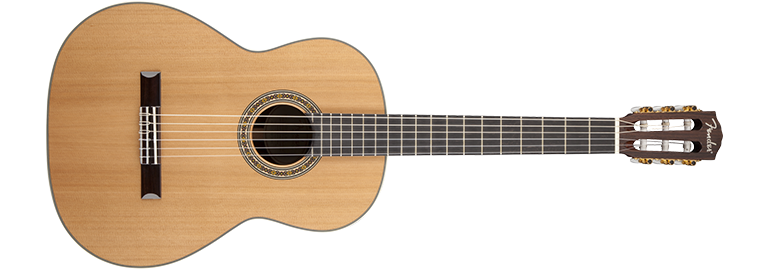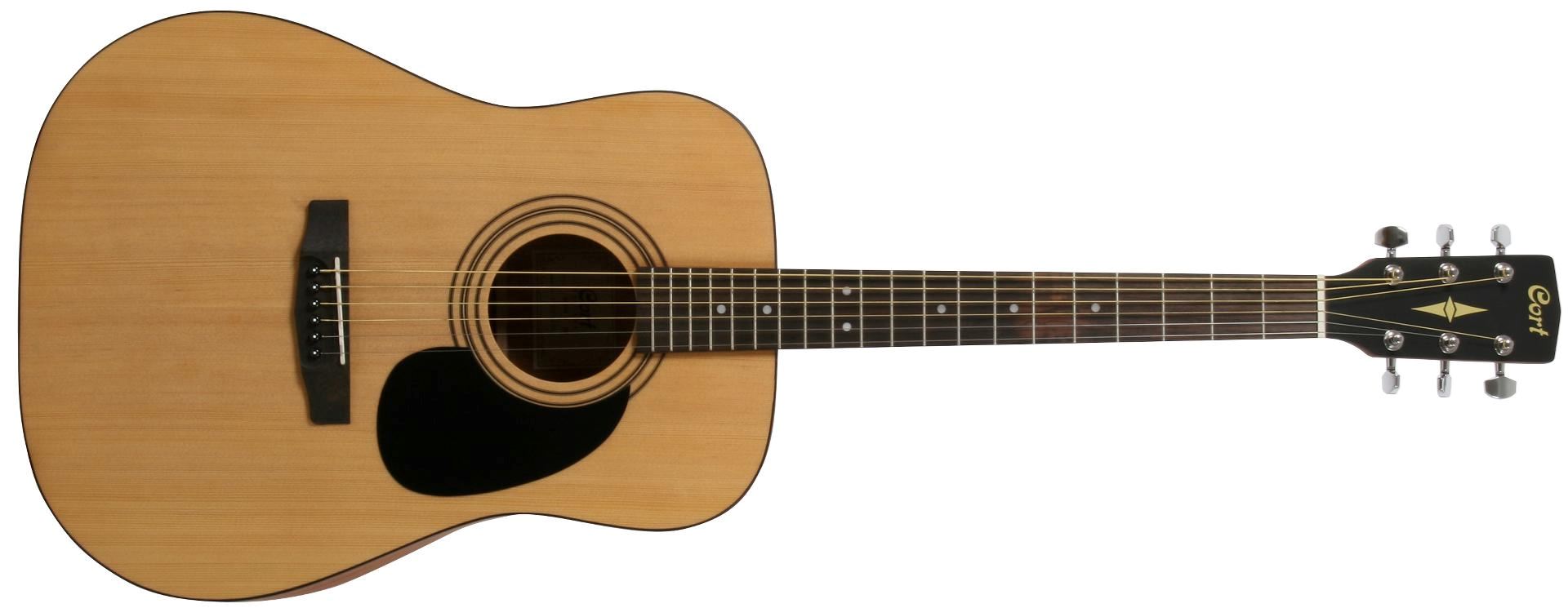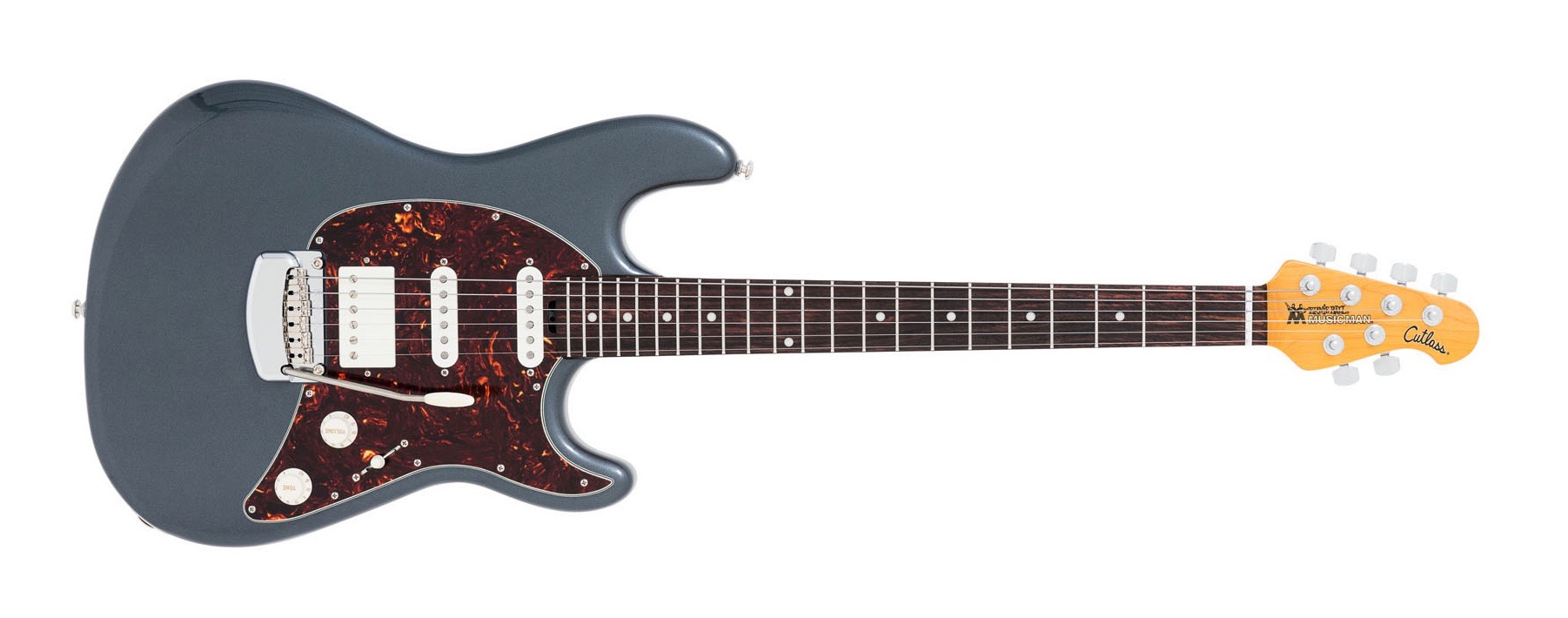The Different Kinds of Guitar
Classical Guitar

The classical guitar is often recommended before the acoustic as a beginner instrument for your first guitar lessons. It's thought to be easier to play as it has nylon strings and a wider fretboard, making chords easier to play. As mentioned before, classical and acoustic guitars are quite different. As a beginner, there are two significant differences to take into consideration before choosing this for your guitar lessons.
The classical guitar has a wider fretboard which can make learning chords a little easier, as there's plenty of room for all your fingers and you can easily see what finger goes where. It also has nylon strings which are much softer than steel strings. This means your fingers are less likely to get sore on your first go! Another advantage to starting on a classical guitar is the nylon strings can make it easier to get a great clean sound sooner. One disadvantage though, is while the wide fretboard can be a great help, it can also be a hinderance - if you have small hands, it might be hard to reach more difficult chords.
Of course, classical guitar is perfect if you're wanting to learn to play classical pieces - hence the name! But if you were working towards pop/rock pieces, it would be worth considering moving on to an acoustic or electric guitar if you're using a classical guitar to begin with.
There's no need to amplify a classical guitar, though you can purchase classical guitars with built-in pickups if needed. Without pick-ups, classical guitars are perfect for small settings like singing songs around a camp fire, in the living room or in small venues.
Acoustic Guitar

The acoustic guitar is equipped with steel strings, which can make it harder on your fingers at first. However, this will pass over time, the more guitar lessons you have. The skin on your fingers will harden and then you won't feel anything! It's a great idea to start building the strength in your fingers from your first guitar lessons, which makes the acoustic guitar a good beginner instrument in that respect. Another advantage of an acoustic guitar is that it has a smaller fretboard which can make it easier to reach difficult chords if you have smaller hands.
Another advantage of the acoustic guitar is the added volume. Acoustic guitars are suitable for small venues as well as bigger audiences. They can also be bought with a pickup fitted to them (this is called an electro-acoustic), which can then be put through a PA system for bigger venues.
Acoustic guitars are often associated with folk/country music, singer-songwriter music and pop.
Electric Guitar

The electric guitar is equipped with metal strings, much like the acoustic. However, the strings are finer and the action is lower, making it much easier to play than the acoustic. 'Action' refers to the height of the strings from the fretboard - when it's lower, the strings are easier to press, and when the action is higher, pressing them down is more difficult. The fretboard is also thinner, making navigation more manageable. You might find your guitar lessons progress a little quicker with the electric, in that respect.
The electric guitar doesn't make much sound on its own - you will need to connect it to an amplifier to get the sound you want. It's also important to choose the right amplifier, so make sure to ask advice from your teacher on a good beginner amp. One of the advantages of the electric guitar is also the wide variation of sound you can achieve - there is almost an infinite array of effects pedals to choose from which can make your guitar sound completely different! You can even build a 'pedal board' with your favourite pedals on it so you can quickly switch sounds for different parts of a song. This is something you can learn about in your guitar lessons.
Parents take note!
There is often some fear around a child wishing to take guitar lessons with electric guitar. It is important to remember that your child may have been inspired by listening to or watching their favourite band. This inspiration is gold dust as it provides a steady stream of motivation – even when the going gets tough! For some students, an acoustic or classical guitar simply won’t cut it. Modern production of amplifiers also means the sound can be controlled. Many beginner amps also come with headphone jacks, enabling near silent practice!
Pedals, effects pedals and all manner of potential accessories are also be a draw for the electric guitar. It's worth saving some room in your budget for some accessories a little way down the line to keep interest levels high! This is in contrast to the simplicity of a well-made classical or acoustic guitar. If classical/acoustic guitar is the instrument of choice, set the best budget you can and use it on an instrument of quality. Well-made instruments by well known brands will hold value, and selling second-hand will be an option should things not work out as planned. Similarly, when searching for an instrument within your price range, the second hand market (with the help of an expert) is an option worth exploring. Ask your guitar teacher in your guitar lessons for advice.
Whichever guitar you choose, it is recommended that you have a professional set-up your guitar before your first guitar lessons. Setting up includes adjusting screws and various elements inside the guitar which can make it more comfortable to play. Get a recommendation from your tutor or a local music shop for the right person to do this for you.
Remember: the most important thing is to find an instrument you are comfortable with since you will be spending many, many hours with it!
